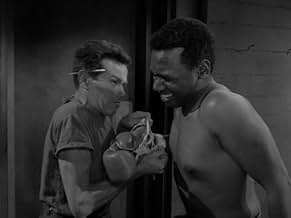The Big Tall Wish
- Episode aired Apr 8, 1960
- TV-PG
- 25m
An aging boxer finds himself the winner of a match he thought he had lost, the result a six-year-old's frantic wish. But can a world-weary, embittered man still believe in miracles, or will ... Read allAn aging boxer finds himself the winner of a match he thought he had lost, the result a six-year-old's frantic wish. But can a world-weary, embittered man still believe in miracles, or will he turn his back on them?An aging boxer finds himself the winner of a match he thought he had lost, the result a six-year-old's frantic wish. But can a world-weary, embittered man still believe in miracles, or will he turn his back on them?
- Narrator
- (voice)
- Tenant
- (uncredited)
- Handler
- (uncredited)
- Joey Consiglio
- (uncredited)
- Handler
- (uncredited)
- Announcer
- (uncredited)
- Tenant
- (uncredited)
- Call Boy
- (uncredited)
- Referee
- (uncredited)
- Director
- Writer
- All cast & crew
- Production, box office & more at IMDbPro
Featured reviews
'Got the whole story cut into his flesh'.
Please watch this episode and judge Bolie Jackson on your own score card.
An Early Twilight Zone Masterpiece
Several reviewers have commented that it was ground-breaking for the time to tell a story about a black man and boy without making race and racial prejudice the central issue of the story. That is certainly true. But if you look closely, there is a theme in "The Big Tall Wish" that reflects on the early Civil Rights Movement and the conflicts within the black community.
The young black boy, Henry, believes that magic can change reality as long as people believe. Bolie Jackson believes there are no miracles and that life can never change for the better. If you read Martin Luther King's book WHY WE CAN'T WAIT he describes this very conflict at great length. While adults and seniors in the black community were initially cautious and pessimistic about the early sit-ins and boycotts, it was the young people and especially the children who were most eager to risk everything to make a change. Dr. King talks in his book about the old pessimism of Booker T. Washington giving way to the new dream of an integrated society.
Now listen to the feverish back and forth between Henry and Bolie and you can almost hear black America's anguished dialog with itself. After so many centuries of horror and heartbreak, the very idea of wishing for a better future seems like a sick joke, and surely an agonizing "gut ache" will result. But the alternative is death itself, man's final defeat in the ring. The "big tall wish" that Henry believes in is actually the very same "dream" that Martin Luther King was to express just a year or two after this television episode was broadcast.
A couple of technical notes: if you compare this early Season One episode to a Season Five boxing episode like "Steel" you can really see the way the show's budget was gutted as ratings began to fade. You can also see the way the TWILIGHT ZONE writers began to parody themselves. Granted that "Steel" is a fine episode in its own right, (thanks largely to an explosive performance by Lee Marvin and solid support by Joe Mantell) but the series decline is very much in evidence.
One wonders why an episode like "The Big Tall Wish" was never included in the TWILIGHT ZONE FAN FAVORITES collections now on sale at big box stores like TARGET. There's no reason devoted fans should have to sit through dreck like "The Last Rites of Jeff Myrtlebank" when masterpieces like this are relegated to that modern day Twilight Zone known as YouTube!
Reversing Fate
Great to see a black leading man; shame about the episode in general.
Mawkish sentimentality and a character who pointedly refuses to believe in and be grateful for the miracle that has been bestowed upon him: The Big Tall Wish might be notable for breaking racial barriers (although the main character is still saddled with the surname 'Jackson'), but it leaves this particular viewer saddened and vexed at Bolie's stubborn refusal to accept the 'big tall wish' made by his 6-year-old pal Henry (Bolie's attitude kinda reminds me of the old fool from Spielberg's Kick the Can who also regrets not believing in magic).
Oh, and while we're at it, Dixon doesn't look fit enough to be a boxer, even one past his prime, and I hate it every time someone refers to his character as an 'old timer' (the actor doesn't look a day over thirty, because he wasn't).
Hope and support a magic little wish!
Did you know
- TriviaAfter airing this episode, with its nearly all-black cast being revolutionary for American television, The Twilight Zone (1959) was awarded the 1961 Unity Award for Outstanding Contributions to Better Race Relations.
- Quotes
Rod Serling - Narrator: [opening narration] In this corner of the universe, a prizefighter named Bolie Jackson, one-hundred and eighty-three pounds and an hour and a half away from a comeback at St. Nick's Arena. Mr. Bolie Jackson, who, by the standards of his profession is an aging, over-the-hill relic of what was, and who now sees a reflection of a man who has left too many pieces of his youth in too many stadiums for too many years before too many screaming people. Mr. Bolie Jackson, who might do well to look for some gentle magic in the hard-surfaced glass that stares back at him.
- ConnectionsEdited into Twilight-Tober-Zone: The Big Tall Wish (2020)
Details
- Runtime
- 25m
- Color
- Aspect ratio
- 1.33 : 1























